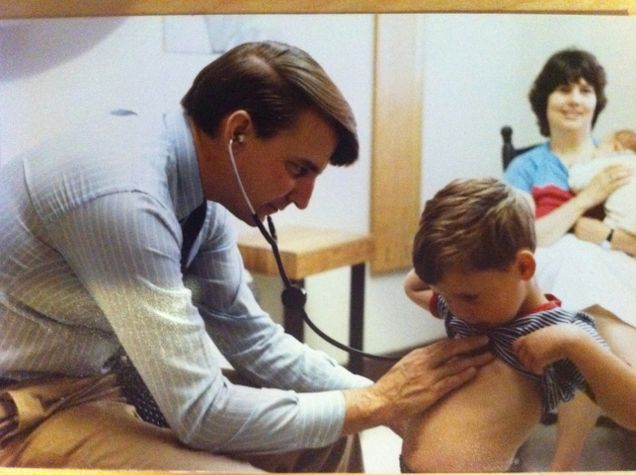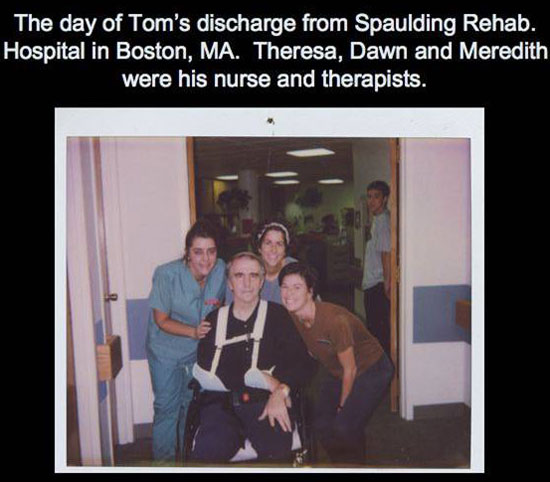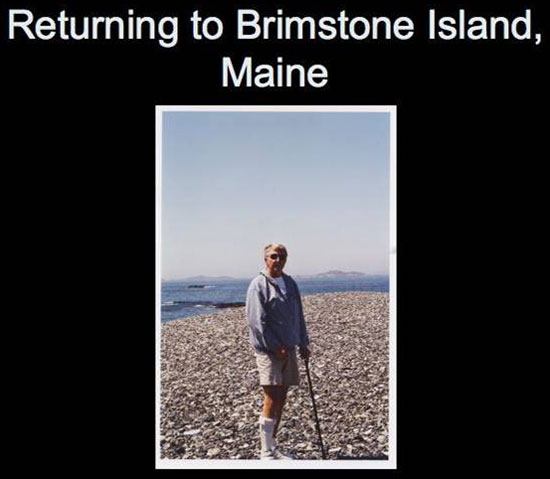Tom’s Story
Prior to my stroke, I was a family physician for 25 years. During the two years preceding my stroke, I worked with Dr. Larry Culpepper in the new Department of Family Medicine at Boston Medical Center.

Tom sees a young patient
The department was well underway with 18 residents, three fellows, a large undergraduate program, and a growing faculty. In August 1999 I had a week-long vacation in Maine.
First, I flew to Halifax so that I could help my friend sail his 46 foot boat from south east Nova Scotia to mid-coast Maine. Peggy, my wife, met me at our house there and we spent Sunday and Monday with her oldest sister and brother-in-law. On Monday evening, our daughter, Carrie, and a nephew joined us on North Haven. The weather was perfect so it was easy to have houseguests.
However, when I awoke on Tuesday morning, I did not feel well. I had a severe headache unlike any I had had before. After the rest of the group went out for a sail, I tried to lay down upstairs. Right away I found I could not raise my right arm or leg into the bed. I could not speak appropriately either. When Peggy, Carrie, and our nephew got back two hours later, I was conscious but slipping fast. I was having a stroke.
I had a massive brain hemorrhage. A cavernous malformation of vessels deep in my brain had burst. The stroke affected the left side of my brain and the right side of my body. As I left the island, I lost consciousness. I was flown to the local hospital in Maine and then taken by helicopter to the Massachusetts General Hospital.
I was disoriented and in a fog for much of the first two months that I was in rehab. I couldn’t follow simple directions. When my doctor asked me how many fingers he was holding up, I had no clue. My body was as floppy as a rag doll. It took two physical therapists to roll me over or get me into a sitting position, and I needed to be tied into a wheelchair. I could not keep both eyes going in the same direction. I couldn’t swallow correctly so my food had to be blended and thickened. I was given medications that I thought I never would have to take.
I could not produce many words and those that I could were difficult for others to understand. Like other stroke victims, I made a recovered gradually. I returned to Maine the next summer, and learned to ride a recumbent tricycle. My family helped me get in and out of boats so I was able to sail again too.
Each month, Peggy and I attended the Aphasia Support Group at Spaulding Hospital. At first I was in a wheelchair unable to say much, but in time I became much more engaged. Interacting with other stroke victims and their families gave us hope for the future.
I continued to receive speech therapy at home. My speech therapist met with me once a week from one to nine years post stroke. She encouraged me to get out and interact with the greater community as much as possible. My first volunteer position was shelving books in the local public library.

While I am no longer a practicing physician, I believe that I am using many of the skills that I developed over my years in practice. As I make my rounds on the sixth floor at Spaulding or the seventh floor at BMC I listen to the patients and their family members. I answer their questions and share my experiences.
My life is very different than before the stroke. And yet it is very much the same. I bring encouragement to stroke survivors who see that I, and they, have gotten better in time. In return, they have given me a sense of purpose and pride.


